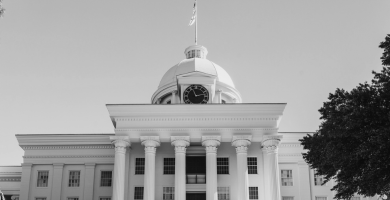The Alabama Legislature adjourned the 2024 session on May 9. The legislature introduced more than 800 bills and passed over 300.
Here is what you may have missed.
In Vitro Fertilization
In February, the Alabama Supreme Court ruled that frozen embryos are children and those who destroy them can be held liable for wrongful death. Following the decision, Alabama legislators quickly introduced a bill to protect in vitro fertilization (IVF) treatments. SB 159 provides civil and criminal immunity to persons providing goods and services related to IVF except acts or omissions that are intentional and not arising from or related to IVF services. The bill was signed into law on March 6.
"I am pleased to sign this important, short-term measure into law so that couples in Alabama hoping and praying to be parents can grow their families through IVF,” said Governor Kay Ivey (R). “IVF is a complex issue, no doubt, and I anticipate there will be more work to come, but right now, I am confident that this legislation will provide the assurances our IVF clinics need and will lead them to resume services immediately."
After the court’s ruling made national news, many states introduced similar legislation. Bills protecting providers of IVF treatments are pending in Delaware, Louisiana, Ohio, and North Carolina. More states, including Illinois, New Jersey, and New York, introduced legislation requiring coverage for IVF in certain insurance plans.
School Choice
Alabama became the 11th state with universal education freedom when the governor signed HB 129, also known as the Creating Hope and Opportunity for Our Students’ Education Act (CHOOSE Act). The bill creates a tax credit program to provide up to $7,000 to a school-age child based on specified factors. The money can be spent on non-public education expenses, including private school tuition, private tutoring, or educational software and applications.
HB 129 also creates an education freedom account program that will be available to families with a household income below 300% of the federal poverty level in 2025 and 2026. In 2027 and beyond, the program will open to all students in the state.
In a press release, Ivey said, “At the end of the day, we all want every Alabama student — no matter the zip code, no matter the school, to receive a quality education.”
Seafood Labeling
HB 66 requires restaurants and grocery stores to notify consumers of the country of origin of seafood products that the establishment offers for sale or advertises. The bill also includes changes for food establishment requirements, restaurant signage requirements, language for in-store delis, and an exception for groups of ten or more people who preorder food items.
The bill was signed by the governor on May 13 and takes effect on October 1, 2024. The Alabama Public Health Department is responsible for promulgating the rules to implement this bill. For questions on the regulatory process for implementation of this measure, please contact Becky Lukaesko at bml@stateside.com.
Gambling
The gambling debate dominated much of the session but ultimately failed. The initial package, mainly comprised of HB 151 and HB 152, included a constitutional amendment to allow a lottery, sports betting, and casino gambling at about seven locations in the state as well as enabling legislation to regulate and distribute proceeds from the bill.
The state house passed the proposals less than a week after introduction, but the bills faced obstacles in the state senate. The senate approved a scaled-back version of the house proposal that included a state lottery and electronic wagering machines at several locations in the state, but the house failed to concur with the senate amendments, sending the bills to a conference committee.
The conference committee version, which included a statewide lottery and allowed for certain electronic games at seven venues across the state, successfully cleared the house but fell short of adoption in the senate by just one vote on April 30, effectively killing the bill.
Looking Ahead to 2025
The Alabama House and Senate both operate with four-year terms. Since 2024 is an off-cycle year for legislative elections, no seats will be on the ballot in November.
Even though lawmakers failed to pass their gambling package, it is expected to remain a prominent subject of discourse during the interim and leading into the 2025 session, especially considering Alabama is among the five states without a statewide lottery. Other topics that did not pass in 2024 and are expected to be revisited in 2025 include children's safety, gender identity, and various education-related issues. In Alabama, legislators are allowed to prefile legislation before their annual session begins, allowing many bills that are of particular interest to policymakers to be filed before the session begins. The 2025 legislative session is scheduled to convene on February 4, 2025.
For questions on any legislation from this past session, please contact Alexander Aceto at aga@stateside.com.
